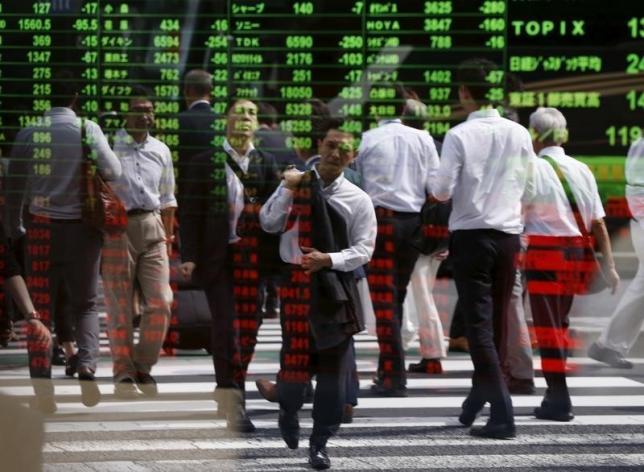Asian shares firm on resurgent oil, Nikkei falls on BOJ
TOKYO: Asian stocks hit a seven-week high on Wednesday as oil prices showed some signs of life, supporting battered resource shares and emerging economy currencies, while Tokyo shares fell after the Bank of Japan stood pat on policy.
MSCI's broadest index of Asia-Pacific shares outside Japan gained 1.1 percent, rising above its Sept 18 peak to reach its highest level since late August.
Japan's Nikkei, however, fell 0.7 percent and the yen rose as much as 0.4 percent to 119.75 to the dollar after the Bank of Japan maintained its policy. Although the outcome was widely expected, some market players had harboured hopes for "surprise easing".
Still, after a string of weak Japanese economic data has raised speculation of fresh stimulus from the BOJ, many traders think BOJ Governor Haruhiko Kuroda may unleash new stimulus as early as its next policy meeting on Oct. 30.
"A lot of people think that the BOJ will act at the end of October due to the weak conditions in the Japanese economy," said Seiki Orimi, senior investment analyst at Mitsubishi UFJ Morgan Stanley Securities.
Outside Japan, share prices were mostly higher as jump in oil prices helped to allay some concerns that a cooling in the Chinese economy could lead to overcapacity in many industries especially the resource sector.
Oil prices broke out of month-old trading ranges, in part supported by news that non-OPEC producer Russia and key OPEC member Saudi Arabia discussed the oil market last week.
The two countries plan to continue exchanging views on the oil market, Russian Energy Minister Alexander Novak told reporters.
Oil traders were encouraged by expectations the world's two largest oil exporting countries may take measures to ease the supply glut, even though analysts have warned that their different positions on Syrian President Bashar al-Assad's future may hamper cooperation.
Brent, the global benchmark for crude, hit a one-month high of $52.47 per barrel, adding 0.8 percent in Asia after a 5.4 percent rise the previous day.
US crude futures hit their highest level since late July, rising to as high as $49.38.
Silver also jumped to 3 1/2-month high of $15.965 per ounce on Tuesday and last stood at $15.935.
Risk assets were also underpinned as many investors have scaled back their expectations that the Federal Reserve would raise interest rates this year following surprisingly weak US jobs data on Friday.
The reaction to the changes in the US rate expectations is evident particularly in Indonesia, where the rupiah surged 2.0 percent on Wednesday, taking its gains so far this week to almost five percent.
The Brazilian real also rose to its highest level in almost three weeks, also helped by hopes that President Dilma Rousseff's efforts to strengthen her political coalition through a cabinet reshuffle will pay off.
The Australian dollar hit a two-week high of $0.7188 while the Canadian dollar firmed to C$1.3026, closing in on its September peak of C$1.3013.
The US dollar was soft against major currencies as expectations of a Fed rate hike before year-end ebbed.
The dollar's index against six major currencies fell to 95.327, its lowest level this week and near Friday's low of 95.218.
The euro traded at $1.1267, near this week's high of $1.12895.






